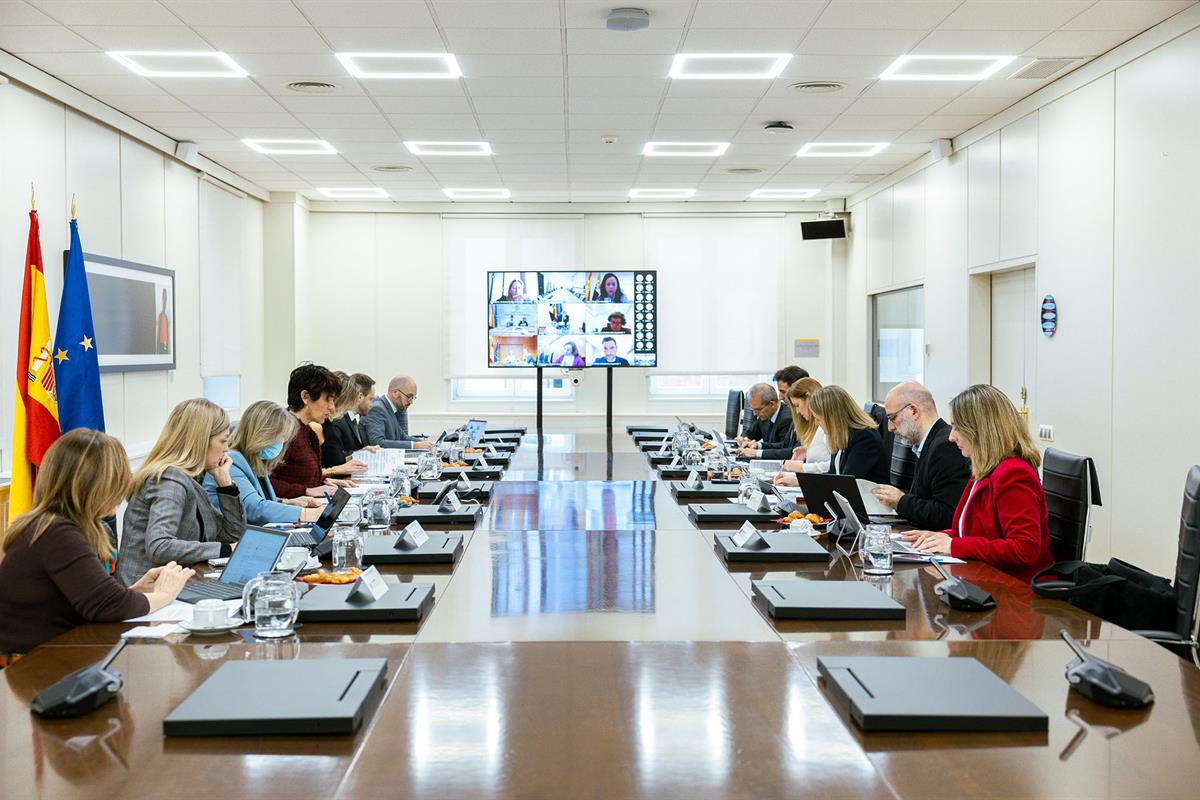Spain leads the drafting of the Implementation Plan of the European Migration and Asylum Pact
News - 2025.3.17
 The Minister for Inclusion, Social Security and Migration, Elma Saiz, chairs the 13th Sectoral Conference on Migration
The Minister for Inclusion, Social Security and Migration, Elma Saiz, chairs the 13th Sectoral Conference on Migration
Minister Elma Saiz, accompanied by the Secretary of State for Migration, Pilar Cancela, has informed the councillors of the autonomous communities and the Spanish Federation of Municipalities and Provinces of the current migratory situation.
They also discussed the implementation of the European Migration and Asylum Pact and the forthcoming implementation of the renewed Regulation on Foreigners, in force from 20 May.
Saiz also reported on the status of the Plan for Integration and Intercultural Coexistence and its co-governance and funding mechanisms.
Migration status
With regard to the current migratory situation, minister Elma Saiz assured that the arrival of people on our coasts "has reduced 22% so far this year," fundamentally due to the reduction in arrivals in the Canary Islands.
"One of the key factors in reducing irregular arrivals is the Government's commitment to circular, safe and orderly migration. In 2024, we welcomed 20,515 workers, mainly from Morocco, Colombia, Honduras and Ecuador," she explained. By 2025, the forecast is to increase this figure to 25,300 people, with the addition of new countries such as Tunisia and Egypt. "This strategy not only strengthens our economy, but also offers a legal and secure alternative for those seeking a better future," she said.
On the other hand, according to Saiz, the occupancy of reception centres remains high, largely because the system is adapting to the needs of the moment: "Places are closed when arrivals fall in order to optimise the available resources. As you know, our system is comprehensive and flexible."
New Regulation on Foreigners
On 20 May, the new Regulation on Foreigners will come into force, "a comprehensive reform that modernises the regulatory framework that has been in force for 13 years," explained Elma Saiz. "We have designed a regulation that facilitates regular, orderly and safe ways of accessing and staying in Spain, with a commitment to integration and inclusion in the labour market. The data shows that migration in Spain is not a transitory phenomenon, but a structural component of our society.
Spain has more than 7 million foreigners with valid residence documents, of whom more than 5 million have a stable and permanent administrative situation. In addition, every year, more than 200,000 people obtain Spanish nationality by residence.
As for the main new features included in the text, Saiz highlighted the strengthening of the concept of "arraigo", which facilitates access to residence and employment for those who have been in Spain for some time. In addition, the profiles of people eligible for asylum or asylum with roots are clarified and differentiated, guaranteeing the appropriate use of each figure.
The text expands opportunities for family reunification, with measures benefiting the children of Spanish citizens and those who have recently obtained nationality, and strengthens labour migration. Access to the labour market is extended from the outset for most of the authorisations and by strengthening programmes such as recruitment at source for seasonal work. "With the entry into force of this new regulation, which modernises and streamlines the processes, we are facilitating new regular channels of access and permanence in Spain in order to continue promoting inclusion in the labour market," the minister stressed.
In addition, progress is being made in the regulation of new figures, such as the specific authorisation for victims of sexual violence, in compliance with the Organic Law on the Comprehensive Guarantee of Sexual Freedom.
European Migration and Asylum Pact
With regard to the European Migration and Asylum Pact, Elma Saiz reiterated Spain's commitment to implementing it as soon as possible with a humanist, solidarity-based and effective approach. "The implementation of the Pact presents challenges, but also opportunities to improve our reception and protection system." Spain is ahead of the established deadlines and sent its National Implementation Plan on 12 December. "Migration is a global phenomenon and its effective management requires a coordinated response, based on solidarity and mechanisms that guarantee both the security of borders and the rights of migrants," said Saiz.
Among other things, the adaptation of the regulatory framework and the strengthening of the reception system are foreseen. It is also envisaged to give greater definition to the management of border procedures by precisely defining the locations where the files will be processed and ensuring that the rights of the people concerned are respected. Spain must also present its Contingency Plan, with measures to respond to exceptional arrivals and guarantee adequate care for minors seeking international protection.
Intercultural Integration and Coexistence Plan
Minister Elma Saiz reiterated to the autonomous communities the importance of their contributions to the Integration and Intercultural Coexistence Plan on which the ministry is working and which is currently undergoing public consultation. "Integration is a cross-cutting policy that requires contributions from different administrative, territorial, sectoral and even individual perspectives," she said.
The plan will establish a comprehensive intervention framework, which not only includes initial reception, but also focuses on the autonomy and full participation of migrants in Spanish society. To this end, measures will be strengthened in key areas such as access to employment, education, housing and civic participation. "This plan will have specific resources and concrete measures to promote the integration of foreigners in our society," said Saiz. "It is conceived as a cross-cutting strategy of public policies that benefits all citizens, although it sometimes includes specific actions for specific groups, so that our country can move towards a more inclusive model."
Non official translation







